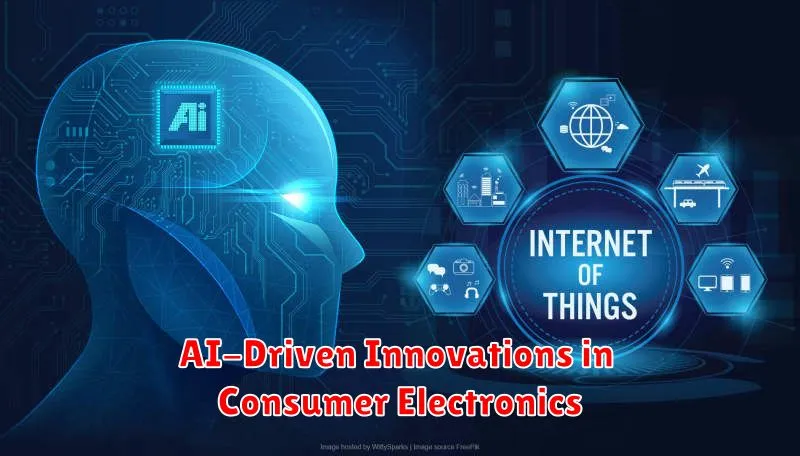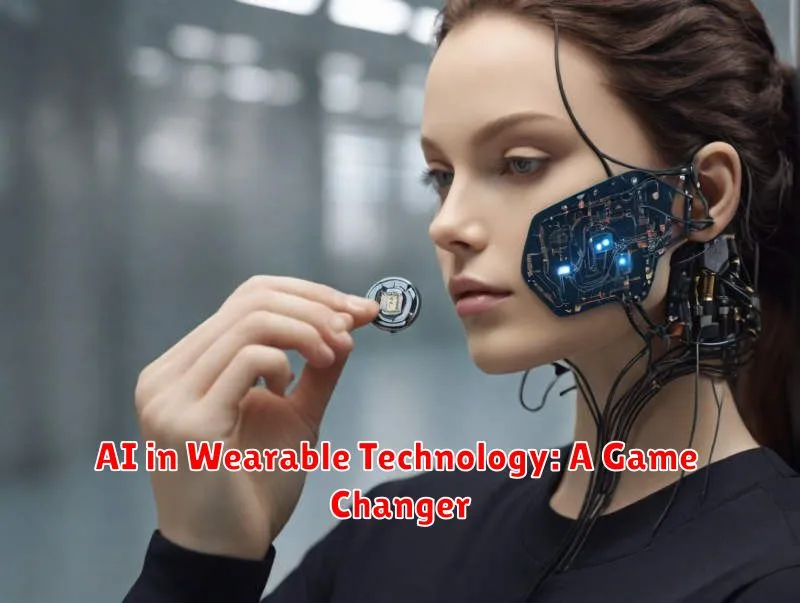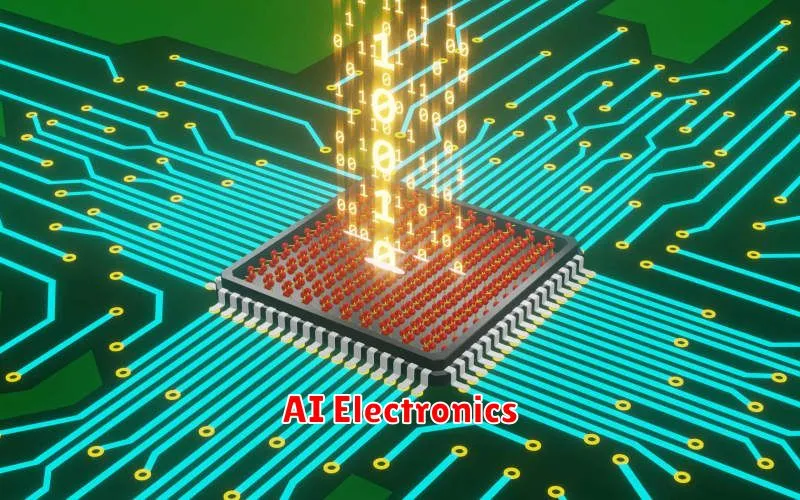Artificial intelligence (AI) is rapidly changing the world around us, and the consumer electronics industry is no exception. From smart home devices to self-driving cars, AI is revolutionizing the way we live, work, and play. With its ability to learn and adapt, AI is transforming the future of consumer electronics, making devices smarter, more personalized, and more user-friendly than ever before.
The impact of AI on consumer electronics is already being felt across a wide range of industries. AI-powered devices are making our homes more efficient and comfortable, our cars safer and more convenient, and our entertainment experiences more immersive and engaging. As AI technology continues to evolve, we can expect to see even more groundbreaking innovations in the years to come, transforming the way we interact with the world around us.
AI-Driven Innovations in Consumer Electronics

Artificial intelligence (AI) is rapidly transforming the consumer electronics industry, revolutionizing how we interact with our devices and experience the world around us. From smart home appliances to personalized entertainment systems, AI is driving innovation across a wide range of products and services.
One of the most significant impacts of AI is the development of smart assistants. Devices like Amazon Alexa, Google Assistant, and Apple Siri use natural language processing (NLP) to understand and respond to user requests, providing access to information, controlling smart home devices, and automating tasks. These assistants are becoming increasingly sophisticated, learning user preferences and adapting to their needs over time.
AI is also transforming the way we consume entertainment. Streaming services like Netflix and Spotify use AI to personalize content recommendations, ensuring users discover movies, shows, and music they’ll enjoy. AI-powered facial recognition technology is enhancing security and personalization in devices like smartphones and smart TVs.
In the realm of smart homes, AI is enabling devices to learn user habits and automate tasks. Smart thermostats, lighting systems, and security cameras can adapt to user preferences and provide personalized experiences. AI-powered home appliances like refrigerators and ovens can monitor food supplies, suggest recipes, and even order groceries automatically.
As AI continues to evolve, we can expect even more transformative innovations in consumer electronics. From AI-powered healthcare devices to augmented reality experiences, the possibilities are endless. The future of consumer electronics is bright, powered by the intelligence and capabilities of AI.
The Role of AI in Personalized User Experience
Artificial intelligence (AI) is playing a transformative role in the future of consumer electronics, revolutionizing how we interact with our devices and shaping our everyday experiences. A key aspect of this transformation is the rise of personalized user experiences, where AI empowers devices to understand individual preferences, adapt to changing needs, and provide tailored interactions.
AI-powered personalization is driven by the ability of algorithms to analyze vast amounts of data, including user behavior, preferences, and contextual information. This data allows devices to learn about individual users, anticipate their needs, and customize functionalities accordingly. For example, smart home devices can adjust temperature and lighting based on user routines, music streaming services can recommend personalized playlists, and fitness trackers can offer personalized workout plans.
The benefits of personalized user experiences are numerous. By adapting to individual preferences, devices become more intuitive, efficient, and enjoyable to use. This leads to increased user satisfaction, engagement, and loyalty. AI-powered personalization also has the potential to improve accessibility and inclusivity by tailoring user interfaces and functionalities to meet the specific needs of diverse users.
As AI technology continues to advance, we can expect even more sophisticated and personalized experiences in the future. From AI-powered virtual assistants that anticipate our needs to smart devices that learn and adapt to our evolving lifestyles, the potential of AI to enhance consumer electronics and create truly personalized experiences is immense.
How AI is Changing the Way We Use Electronics
Artificial intelligence (AI) is rapidly transforming the consumer electronics landscape, fundamentally changing how we interact with our devices. From smartphones to smart homes, AI is enhancing user experiences, personalizing interactions, and automating tasks.
One of the most significant impacts of AI is the rise of voice assistants like Siri, Alexa, and Google Assistant. These AI-powered interfaces allow users to control their devices with voice commands, making interactions more natural and intuitive. By understanding natural language, AI can perform tasks such as setting alarms, playing music, and searching for information.
AI is also driving advancements in personalization. By learning from user behavior and preferences, AI algorithms can tailor content, recommendations, and settings to individual users. This personalized experience can be seen in streaming services like Netflix, which suggest movies based on past viewing history, and in e-commerce platforms, which recommend products based on browsing habits.
Furthermore, AI is enabling automation in consumer electronics. From smart thermostats that adjust temperature based on user preferences to robotic vacuums that clean floors autonomously, AI is simplifying tasks and making our lives easier.
As AI continues to evolve, its influence on consumer electronics will only grow. We can expect even more personalized, intelligent, and seamless interactions with our devices in the future.
AI in Wearable Technology: A Game Changer

The integration of Artificial Intelligence (AI) into wearable technology is revolutionizing the way we interact with our devices and experience the world around us. From smartwatches to fitness trackers, AI is enhancing user experience, improving health outcomes, and opening up new possibilities in the consumer electronics market.
One of the most impactful ways AI is transforming wearable technology is through personalized experiences. AI algorithms can analyze user data, such as heart rate, sleep patterns, and activity levels, to provide tailored recommendations and insights. This personalized approach enables devices to deliver more relevant information, offer customized fitness plans, and even predict potential health issues.
Moreover, AI is driving advancements in health monitoring and disease management. Wearable devices equipped with AI can track vital signs, detect anomalies, and provide early warnings about potential health risks. This real-time data can empower individuals to take proactive steps towards better health and assist healthcare professionals in making more informed decisions.
The future of wearable technology promises even more exciting possibilities. AI-powered voice assistants are becoming increasingly sophisticated, allowing users to control their devices with their voice, access information, and even make purchases seamlessly. Augmented reality (AR) and virtual reality (VR) integration is also enhancing the user experience, creating immersive and interactive applications for entertainment, education, and beyond.
In conclusion, AI is a game-changer for wearable technology, driving innovation and shaping the future of consumer electronics. From personalized experiences to enhanced health monitoring and exciting new applications, AI is paving the way for a more connected, intelligent, and empowered world.
Future Trends in AI-Driven Electronics
Artificial intelligence (AI) is revolutionizing consumer electronics, ushering in a new era of personalized and intuitive experiences. As AI technology advances, we can expect to see even more transformative trends in AI-driven electronics, reshaping the way we interact with our devices and the world around us.
One prominent trend is the rise of AI-powered personal assistants, becoming increasingly sophisticated and capable of understanding complex commands and anticipating our needs. These assistants will seamlessly integrate into our lives, managing our schedules, controlling our smart homes, and even providing personalized recommendations.
Another key trend is the emergence of AI-driven personalized experiences. From entertainment to health and wellness, AI will tailor content and services to our individual preferences, creating a more engaging and meaningful user experience. This includes smart devices that learn our habits and adapt to our needs, recommending products, optimizing settings, and providing personalized insights.
Furthermore, AI will play a pivotal role in enhancing security and privacy. AI-powered security systems will be able to detect and prevent threats, while privacy-enhancing technologies will ensure our data is protected from unauthorized access. This will be crucial as we increasingly rely on connected devices and share personal information online.
Finally, AI will drive advancements in robotics and automation, leading to the development of intelligent devices that can assist us in our daily lives. From smart home appliances to robots that perform tasks like cooking and cleaning, AI will empower us to live more efficiently and conveniently.
The future of consumer electronics is bright, with AI poised to revolutionize the way we interact with technology and the world around us. As AI continues to advance, we can expect to see even more innovative and transformative applications that enhance our lives in countless ways.
Case Studies: AI-Powered Consumer Electronics
AI is rapidly transforming the consumer electronics industry, enhancing user experiences and creating new possibilities. Here are some compelling case studies showcasing the impact of AI in consumer electronics:
Amazon Alexa is a prime example of AI-powered voice assistants revolutionizing home automation. Alexa’s natural language processing (NLP) and machine learning capabilities allow users to control smart devices, access information, and enjoy entertainment through voice commands. The AI continuously learns user preferences, providing personalized recommendations and a seamless experience.
Google Assistant, another prominent voice assistant, leverages AI for a range of tasks, from setting reminders and sending messages to controlling smart home devices and providing real-time information. Google Assistant’s ability to understand context and adapt to user habits makes it a powerful tool for everyday life.
Samsung’s SmartThings platform integrates AI into home appliances, enabling smart features like automatic laundry cycles and optimized energy consumption. The platform utilizes machine learning to predict user needs and proactively adjust settings for greater convenience and efficiency.
Sony’s Bravia XR TVs employ AI-powered Cognitive Processor XR, which analyzes and processes images to deliver stunning visual experiences. The AI analyzes real-world data to reproduce realistic textures and depth, enhancing picture quality and immersion.
Tesla’s Autopilot system utilizes AI for advanced driver-assistance features, such as adaptive cruise control, lane keeping assist, and automatic emergency braking. The system continuously learns from real-world data, improving safety and efficiency.
These case studies demonstrate the transformative power of AI in consumer electronics. From voice assistants to smart homes and autonomous vehicles, AI is enhancing user experiences, improving efficiency, and creating new possibilities for the future.

